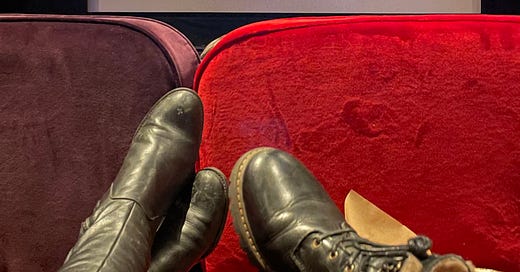Wonka Film Review: ‘Nutty or Absolutely Insane?’
Timothée Chalamet stars as the kooky chocolatier in his younger years in this feast of a film from the writers of Paddington 2.
The new prequel to Road Dahl’s story of a reclusive chocolatier depicts Wonka before the fame, with empty pockets and a hat full of dreams. Directed by Paul King, co-written by King and Simon Farnaby and produced by David Heyman, this reimagining sees a naively optimistic Wonka fall prey to the scoundrels of an indeterminate pre-war European city. Aided by an indentured orphan called Noodle (Calah Lane), Wonka galvanises a rag-tag group to his underdog quest for freedom and a chocolate shop.
This is a film to satiate gluttony. Excess abounds from an illustrious cast list to musical numbers and the garish splendour of Wonka’s confectionary creations. Olivia Colman is Mrs Scrubbit, a blend of the Misses Trunchbull and Hannigan (most villainous women are spinsters, naturally) who exploits ‘peasants’ alongside her partner-in-crime Bleacher, played by Tom Davis. Keegan-Michael Key is the sweet-toothed police chief whose corruption is shown through his increasing waistline, but the low-hanging fruit of a fat-suit joke strikes a sour note. Hugh Grant appears as the Lofty the Oompa Loompa: singing, dancing and digitally shrunken in a move that neatly side-steps upsetting people of short stature as previous adaptations have done, and Rowan Atkinson adds another Priest role to his collection, this one discreetly popping treats alongside his chocoholic monks.
Paterson Joseph, Mathew Baynton, and Matt Lucas are wonderful as Slugworth, Fickelgruber and Prodnose: the Chocolate Cartel trio who despise poverty whilst hoarding money, chocolate and commerce. They butter-up palms even during their own fan-waving, toe-tapping musical number. Along with Charlotte Ritchie and Simon Farnaby in comedic cameo roles, Baynton contributes to a mini Ghosts reunion. Jim Carter is a joy as accountant Abacus, who throws in a classic Carson-the-butler line straight from Downton Abbey when Wonka returns to the scrub-room post escapade: ‘Good of you to join us’. But it’s Calah Lane as the bookworm Noodle who provides much of the film’s gravity. The lone child who attempts to teach Wonka to read, and to ‘read the fine print’, she provides common sense to ground his whimsy. Never having tried chocolate before, she learns the value of a little indulgence and of big dreams, but even when facing death by chocolate counters his absurdity with more sensible ideas.
The original songs and energetic dance numbers are pitch-perfect alongside the nostalgia of Leslie Bricusse and Anthony Newley’s “Pure Imagination”, and the set is a treat for the eyes. Landmarks such as London’s St Paul’s Cathedral and Oxford’s Bridge of Sighs (a giraffe speedily ducks under it) interplay with the colour, chaos and sheer surplus cooked up by Wonka’s imagination. The visual gastronomy and scenes of scoffing crowds didn’t, however, inspire any cravings. The Chocolate Cartel’s white-boxed truffles appeal more than Wonka’s ‘hoverchocks’ and candy clouds.
Played as psychedelic and psychologically scarred by Gene Wilder and Johnny Depp in previous adaptations of Dahl’s novel, here the titular character is all pizzaz and sweetness. Chalamet recently declared Tom Holland to be the ‘Ultimate Rizz Master’, but his Wonka is the epitome of charm (‘Rizz’ for charisma is the OED’s Word of the Year for 2023). In the bleakest moments he maintains good intentions, manners and humour and as endearing as this is, such sentimentality keeps us stuck in syrupy smoothness without the relief of any hard crunch. When Wonka asks Noodle how she’d like her chocolate – nutty or absolutely insane, his exuberance isn’t quite backed up by sufficient bite.
The lead character’s kindness to all comers prevents the film from being the prequel it’s been touted as, because whatever life event turns the gifted chocolatier from a relentlessly nice young entrepreneur to a brilliant recluse remains unexplored. Jostling hilarious but limited side-plots without a star thread to get behind also restricts the character development. Tim Burton’s 2005 film gestured at a backstory of paternal severity and childhood bullying to explain the reserved and morally punitive Willy Wonka, complete with clinical latex gloves. Here, he’s trying to recapture a poor but halcyon childhood with his late mother, played by Sally Hawkins, with a persistently sunny outlook.
Far from the eccentric factory owner who changes the lives of rude children in bizarre and disturbing ways, this Wonka, though eccentric, is a revitalising catalyst, almost saviour, in the lives of those around him. Chasing the dreamed-for chocolate shop, Wonka flippantly adds ‘change the world’ to his to-do list along the way. As our trio of villains say, ‘he’s good - too good.’ and with these disparate character versions unlinked, the film ends in a vastly different place to where the book and its previous adaptations begin. Perhaps a sequel will come along to bridge the gap.
There are parallels to gems like Mary Poppins, Matilda and Les Misérables that clearly show what category this film belongs to: a family-friendly favourite to watch in the run-up to Christmas. Yet the best way to view this film is standalone, without reference to the 1971 or 2005 adaptations of Charlie and the Chocolate Factory, and with as little regard to the problematic aspects of Dahl’s creation as possible. Many murky themes receive a strong nod – poverty, indentured slavery, colonialism and reparation, systemic corruption and greed – but we aren’t invited to dwell too deeply. The goal is escapism, to feel ‘free as a flamingo’ as the optimistic chocolatier would say. Easily done when watching two-hours chockfull of pure imaginative delight. 4/5 stars.
Wonka is released on 8 December in the UK, 14 December in Australia and on 15 December in the US. View the UK trailer here.




